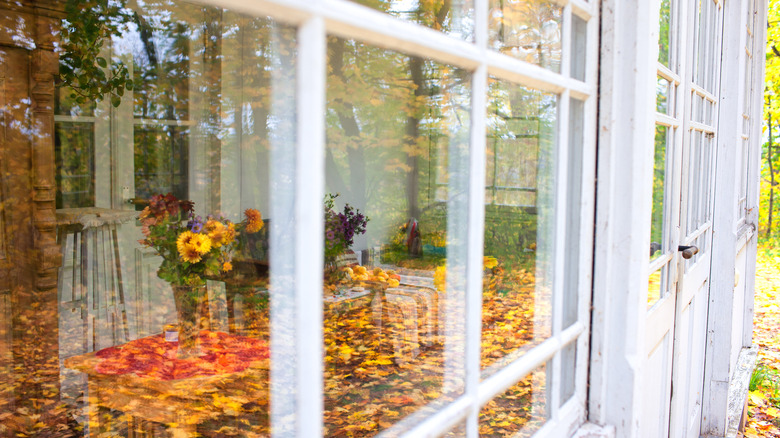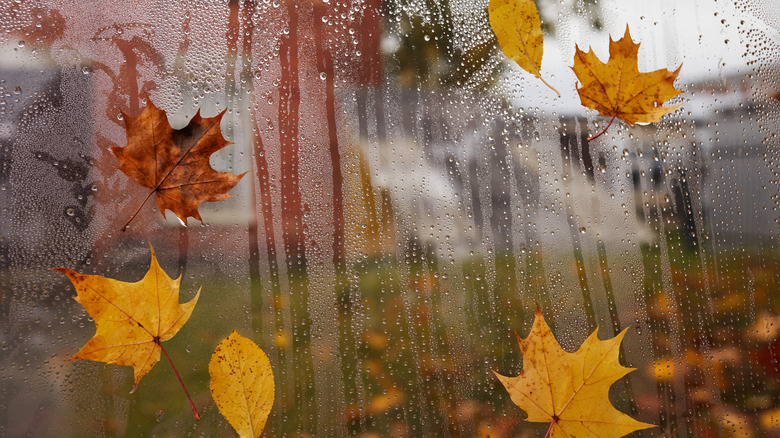The Fall Window Cleaning Task That Helps Let In More Light During Dark Winter Days
We may receive a commission on purchases made from links.
When winter days bring dishearteningly dreary skies and shorter days, the temptation might be to yank the draperies closed and burrow under your warmest blankets. But if those bleak days make you want to actively resist the allure of a hibernation day and instead brighten up your home, there is a fall window-cleaning task that helps let in more light during those dark winter days. Creating a home that allows natural light to get its glow on is as easy as washing your windows, and one additive to the cleaning solution can provide a cleaning boost and keep the windows cleaner for a more extended period of time. The ingredient is glycerin, a thick, clear liquid with surprising power to work a little magic on your panes.
If you are exploring the best ways to improve natural light in your home but aren't planning to knock down walls or add extra windows, you will probably want to take the path of least resistance and make sure the windows you do have are letting in as much light as possible. Obviously, grimy windows or ones covered in film will filter the sunlight trying to shine through. You may wonder, though, why you shouldn't simply wash them with any old window cleaner? You can do that, of course — but adding a tiny amount of glycerin, "not only cleans the glass, but it creates a microscopic layer that repels dust, fingerprints, and condensation," says Scott Schrader, cleaning expert at CottageCare. (via Homes & Gardens)
Mix up a DIY window-cleaning solution with glycerin
You may have seen glycerin in a list of food ingredients or in a myriad of other items, like cosmetics, moisturizers, and toothpaste. Glycerin, also known as glycerol, is a clear, slightly viscous liquid that is somewhat sticky and classified as a sugar alcohol. It's most frequently derived from vegetable sources; however, its notable characteristic is its ability to hold water — it's a humectant, which is what makes it so helpful for window cleaning. As a humectant, it has anti-fog properties, which is an excellent feature for windows. Glycerin also acts as a protective barrier on glass surfaces, which helps reduce the amount of dust and dirt that sticks to the window.
You may have tried to DIY a glass cleaner that never leaves streaks and possibly had great luck with it. There are plenty of recipes for homemade window cleaners, but this solution couldn't be easier: mix two to three drops of glycerin (like Froggy Fog's SMPLY Vegetable Glycerin) in a quart of lukewarm water. Use it immediately and dry thoroughly with a microfiber cloth, such as the TEAWOO Microfiber Cleaning Towels. Their 12-inch size gets the job done, and the gray color hides stains and washes easily.
Clean your windows with glycerin in the fall for lasting results
There's no doubt you have an abundance of things to do around your house and garden in the fall. Window cleaning might seem like just one more chore to squeeze in during the shorter days. But cleaning your windows after they have been sullied all summer by everything from pollen to bird guano is an important task. Not only will the clean windows let in more of the limited light occurring in the fall and winter months, but window scrubbing is a task not easily tackled as the weather turns icy. Fall is also a good time for window cleaning because the days are less warm and sunny, so the window cleaning solution you spray on the glass won't dry as quickly, making it easier to complete your chore with fewer streaks.
You will also notice that it's a bit easier to get to the outside window surfaces when you clean them in the fall. Why? There are fewer leaves to get in your way. The fallen leaves are also a reason to tackle this task in the autumn. Falling leaves may be pretty, but not if they are decaying on your windows and windowsills. Take some time in the fall to get everything sparkly, bright, and more likely to stay that way longer because the added glycerin will repel dirt long after the last leaf falls.


